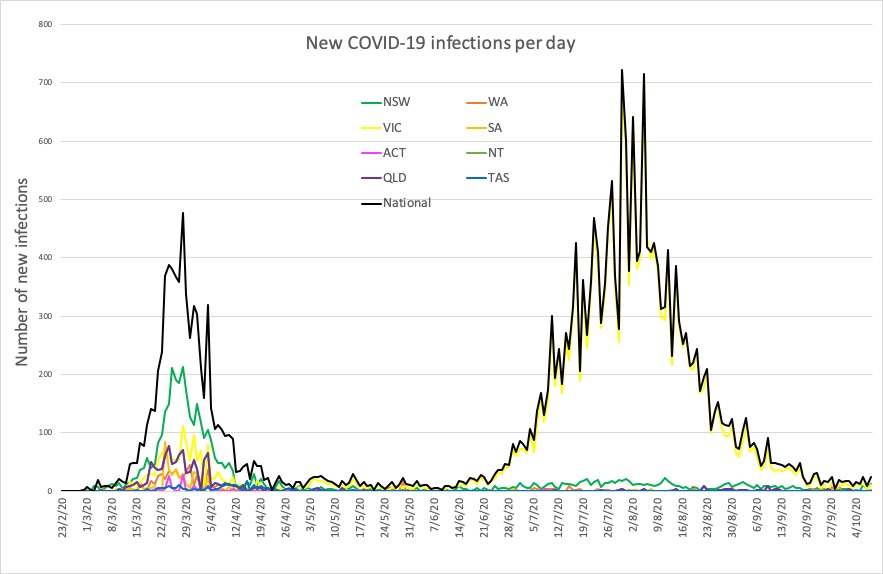The antiviral treatment is associated with a shorter time to recovery in patients with moderate to severe COVID-19, but not in those on mechanical ventilation, a study suggests.
Welcome to The Medical Republic’s COVID Catch-Up.
It’s the day’s COVID-19 news in one convenient post. Email bianca@biancanogrady.com with any tips, comments or feedback.
9 October
- Remdesivir may shorten time to recovery in patients on oxygen but not mechanical ventilation.
- Wash cloth masks after use in a washing machine, not by hand, study suggests.
- Latest confirmed COVID-19 infection numbers from around Australia.
- Remdesivir treatment is associated with a shorter time to recovery in patients with moderate to severe COVID-19, but not in those on mechanical ventilation or who have had a longer duration of symptoms, a new study has found.
A paper published in the New England Journal of Medicine reports the outcomes of a double-blind, randomized, placebo-controlled trial of IV remdesivir in 1062 hospitalized with Covid-19 and with evidence of lower respiratory tract infection.
The study, funded by the National Institutes of Health, found overall, patients treated with remdesivir had a median 10 days until recovery – released from hospital or hospitalised for infection control only – compared to 15 days among those who received placebo.
The benefits were only statistically significant among patients who were receiving oxygen but not on mechanical ventilation or ECMO, and in those who had had symptoms for fewer than 10 days.
The drug was not associated with a significant improvement in time to recovery in Black or Asian patients, and had borderline significant effects in Hispanic patients.
The study looked at mortality as a secondary outcome, and found that there was a statistically significant improvement in mortality rates at day 15 with remdesivir, but by day 29 this improvement was no longer significant. Again, the greatest gains were seen in patients treated with oxygen but not on mechanical ventilation.
“Cumulatively, these findings suggest that treatment with remdesivir may not only reduce the disease burden but may also decrease the use of scarce health care resources during this pandemic,” the authors wrote.
(As a side-note, sorry about all the ‘statistically significant’s appearing in this summary, but in this case, they’re important to mention so as not to give the impression this study was a slam-dunk for remdesivir – BN) - Two-layer cloth masks appear to be as effective as surgical masks against respiratory viruses, if the masks are washed after use in a washing machine instead of by hand.
A study conducted before the pandemic examined the incidence of infection and contamination of masks with rhinovirus in 607 healthcare workers across 14 hospitals in Vietnam.
The results, published in BMJ Open, found a two-fold higher rate of infection among those who hand-washed their cloth masks compared to those who had them washed in the hospital laundry. However there was no difference in infection rates between those who wore surgical masks, and those who wore cloth masks washed at the laundry.
“Daily washing of cloth masks at the recommended temperature of 60°C–90°C in whatever setting they are used, including the community, is essential for safety,” the authors wrote. - New South Wales has recorded a higher number of new COVID-19 infections in 24 hours than Victoria, with eight new locally-acquired cases reported along with four cases in returned travellers in hotel quarantine. Public health warnings have been issued for Potts Point restaurant Monopole, as well as a number of train and bus routes across the city and out to Moss Vale, south of Sydney.
Meanwhile, Victoria is working to contain two new outbreaks linked to the Chadstone Shopping Centre, and Oddfellows Café in Kilmore.
Here are the latest confirmed COVID-19 infection numbers from around Australia, to 9pm Thursday:
National – 27,206, with 897 deaths
ACT – 113 (0)
NSW – 4261 (12)
NT – 33 (0)
QLD – 1160 (0)
SA – 472 (0)
TAS – 230 (0)
VIC – 20,247 (11)
WA – 690 (2)



